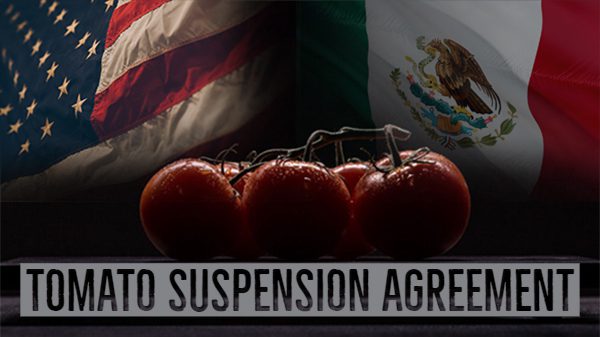PRESS RELEASE WASHINGTON, May 13, 2019 — The associations representing the Mexican tomato growers continue to negotiate in good faith on a new agreement to suspend the antidumping investigation on fresh tomatoes from Mexico.
The proposals from the Florida Tomato Exchange for more than a year, however, include several demands that are unlawful, which is the reason the growers rejected the Commerce Department’s latest proposal last Friday. That proposal would have stripped U.S. supermarkets and other buyers of Mexican tomatoes of their legal rights to reject tomatoes with condition defects and be reimbursed for their costs.



In the meantime, the Mexican growers have taken several key actions to protect their legal rights in light of several disappointing actions taken by the U.S. Commerce Department. First, the Mexican growers led for an injunction from a U.S. court to stop Commerce’s investigation from going forward and stop cash deposits from being imposed. The basis for this lawsuit is that the Commerce Department’s termination of the agreement was unlawful. Second, the Mexican growers shortened the period they will be subject to cash deposits by 60 days.
If the resumed investigation does go forward, the Commerce Department must now conclude its dumping determination on July 21, and the U.S. International Trade Commission must conclude its injury determination on September 4. While the Mexican growers remain committed to a new agreement, it must be fully reflective of U.S. law and the evidence on the record of the proceeding. The Mexican growers will continue to work with the Commerce Department to that end. Otherwise, they look forward to the outcome of the investigation, in which they will seek vindication at the International Trade Commission from FTE’s baseless claims of injury.
The growers were denied their legal right to have the ITC consider whether the Florida growers have the right to any protection at all in the recent sunset review because the Commerce Department terminated the agreement two days before the ITC’s scheduled vote. That right to a so-called “sunset review,” in which the need for continued protection is reviewed every ve years, is required under U.S. law and U.S. commitments under the World Trade Organization agreement.
“We would prefer to continue the stability that the suspension agreement has brought to the U.S. tomato market for the past 22 years,” said Rosario Beltran, president of the Mexican grower association, CAADES. “But we need a fair deal and one that does not require us to enter contracts that strip our U.S. customers of their legal rights.”
SOURCE Mexican Tomato Growers
Douglas Kiker
Senior Advisor
M: 202-903-6739
Washington, D.C.
www.indelable.com


